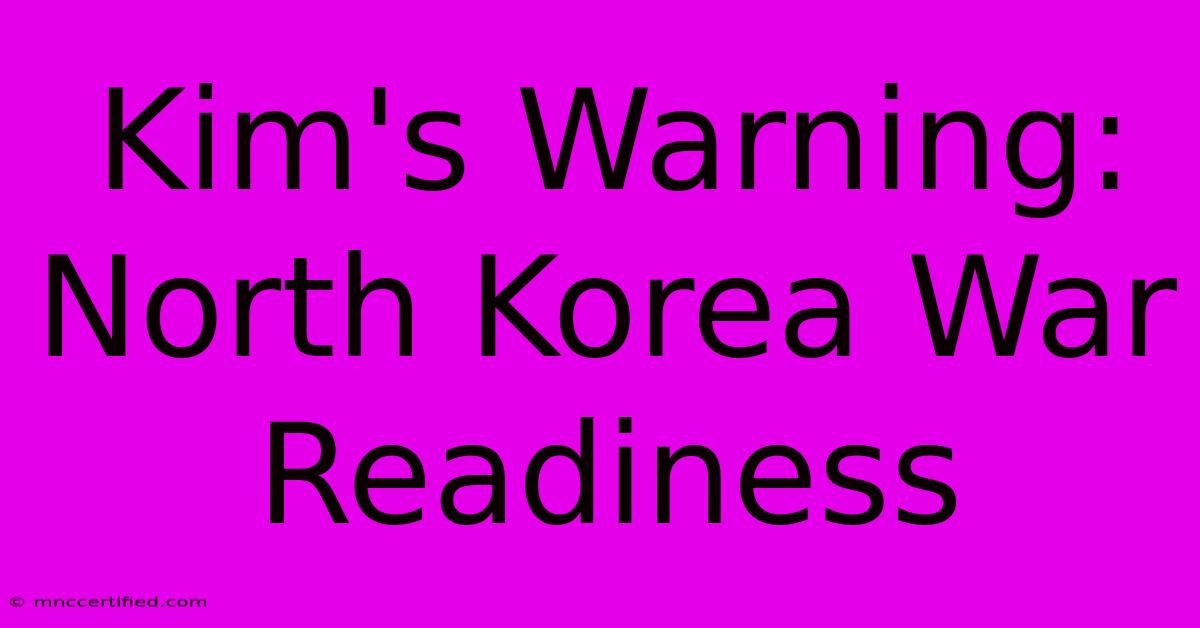Kim's Warning: North Korea War Readiness

Table of Contents
Kim's Warning: North Korea's War Readiness and the Growing Global Concern
North Korea's recent pronouncements and military activities have sent shockwaves across the globe, prompting serious concerns about the potential for conflict. Kim Jong-un's increasingly assertive rhetoric and displays of military might raise crucial questions about North Korea's war readiness and the implications for regional and global stability. This article delves into the current situation, analyzing the factors contributing to heightened tensions and exploring potential scenarios.
Understanding North Korea's Military Capabilities
North Korea possesses a significant military force, though its capabilities are often debated. It boasts a large standing army, estimated at over one million personnel, alongside a substantial arsenal of conventional weapons. However, the true strength lies in its nuclear weapons program and its advancements in ballistic missile technology. These capabilities present a credible threat to its neighbors, particularly South Korea and Japan, and pose a significant challenge to the international community. The development of intercontinental ballistic missiles (ICBMs) capable of reaching the United States further escalates the global stakes.
Key Aspects of North Korea's Military Preparedness:
- Nuclear Weapons Arsenal: The exact size and sophistication of North Korea's nuclear arsenal remain uncertain, but its continued testing and development represent a significant and growing threat.
- Ballistic Missile Technology: Rapid advancements in missile technology, including the development of solid-fuel missiles and submarine-launched ballistic missiles (SLBMs), significantly enhance North Korea's offensive capabilities and complicate potential defensive strategies.
- Cyber Warfare Capabilities: North Korea's growing cyber warfare capabilities represent a less visible but increasingly significant threat, capable of disrupting infrastructure and causing economic damage.
- Conventional Warfare Prowess: While the quality of North Korea's conventional military equipment is a subject of debate, its sheer size and dedication to military training cannot be overlooked.
Kim Jong-un's Recent Warnings and Aggressive Posturing
Kim Jong-un's recent statements have been characterized by strong warnings and aggressive posturing, reflecting a heightened sense of defiance and a determination to pursue his country's nuclear and military ambitions. These actions are often seen as a response to international sanctions, military exercises by its adversaries, and perceived threats to its sovereignty. The frequency and intensity of these warnings are creating an atmosphere of heightened tension and uncertainty.
Analyzing Kim's Motives:
- Deterrence and Security: Kim likely views a strong military and nuclear arsenal as essential for deterring potential attacks and ensuring the regime's survival.
- International Recognition: Demonstrations of military strength are frequently used to gain international attention and recognition, despite the negative consequences.
- Internal Consolidation of Power: Militaristic rhetoric and actions can serve to solidify Kim's control over the North Korean population and suppress dissent.
- Economic Leverage: Threats and provocations are often used to extract concessions or alleviate international pressure on the North Korean economy.
The Global Implications and Potential Scenarios
The escalating tensions on the Korean Peninsula have significant global implications. The potential for miscalculation or accidental escalation of conflict represents a serious threat to regional stability. The involvement of major global powers, such as the United States, China, Russia, and Japan, further complicates the situation and increases the risk of wider conflict.
Potential Scenarios:
- Limited Conflict: A localized conflict involving border skirmishes or limited military actions remains a possibility.
- Full-Scale War: A full-scale war on the Korean Peninsula would have devastating consequences, with the potential for widespread casualties and regional instability.
- Nuclear Escalation: The possibility of North Korea using nuclear weapons, even on a limited scale, remains a grave concern with catastrophic global consequences.
- Diplomatic Resolution: Despite the current tensions, diplomatic efforts to de-escalate the situation and find a peaceful resolution remain crucial.
Conclusion: The Need for Cautious Diplomacy and Strategic Engagement
The current situation with North Korea requires a cautious and nuanced approach. While maintaining strong defensive capabilities is essential, a focus on diplomacy and strategic engagement is crucial to de-escalate tensions and prevent conflict. International cooperation, effective sanctions enforcement, and a commitment to finding peaceful resolutions are essential to navigating this complex and dangerous situation. Ignoring Kim's warnings is not an option; understanding the motivations and carefully responding to them is paramount to preserving global peace and security.

Thank you for visiting our website wich cover about Kim's Warning: North Korea War Readiness. We hope the information provided has been useful to you. Feel free to contact us if you have any questions or need further assistance. See you next time and dont miss to bookmark.
Featured Posts
-
Broncos 4 0 Rout Yotes
Nov 19, 2024
-
British Insurance Giant Crossword
Nov 19, 2024
-
Errors And Omissions Insurance Nj
Nov 19, 2024
-
Life Insurance Companies St Louis
Nov 19, 2024
-
Eyelid Surgery Insurance Coverage
Nov 19, 2024